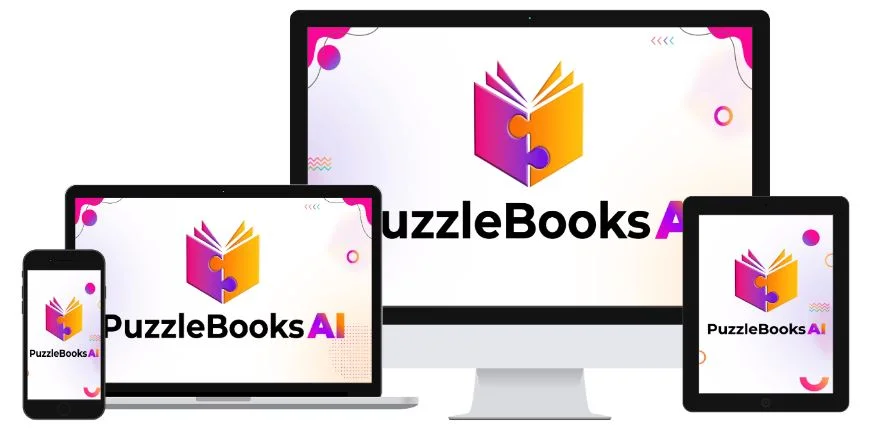Table of Contents
Introduction to PuzzleBooks AI
PuzzleBooks AI Review is an innovative platform designed to simplify and enhance the creation and publication of puzzle books. Leveraging advanced artificial intelligence, it offers a suite of tools that make the process both efficient and user-friendly. This cutting-edge technology is revolutionizing the puzzle book industry by automating puzzle generation, providing customizable templates, and ensuring a seamless user experience.
One of the standout features of PuzzleBooks AI is its AI-driven puzzle generation. This technology allows creators to generate a wide variety of puzzles, such as crosswords, Sudoku, and word searches, with just a few clicks. The AI ensures that each puzzle is unique, challenging, and engaging, catering to different skill levels. This eliminates the need for manual puzzle creation, saving both time and effort.
The user-friendly interface of PuzzleBooks AI is another significant benefit. Designed with ease of use in mind, the platform allows creators, regardless of their technical expertise, to navigate and utilize its features effortlessly. The intuitive layout guides users through the process, from puzzle creation to final publication, making it accessible for both novice and experienced creators.
Customizable templates are also a key feature of PuzzleBooks AI. These templates provide a starting point for creators, offering a variety of design options that can be tailored to fit specific themes or styles. This flexibility ensures that each puzzle book can have a unique look and feel, enhancing its appeal to readers.
The popularity of puzzle books has been on the rise, driven by their appeal as a source of entertainment and cognitive exercise. PuzzleBooks AI capitalizes on this trend by providing a streamlined solution for creating high-quality puzzle books. By automating complex tasks and offering extensive customization options, it empowers creators to bring their puzzle book visions to life with ease.
In summary, PuzzleBooks AI is a game-changer in the world of puzzle book creation. Its AI-driven capabilities, user-friendly interface, and customizable templates make it an invaluable tool for anyone looking to create and publish engaging puzzle books efficiently.
Getting Started: Setting Up Your PuzzleBooks AI Account
Creating an account with PuzzleBooks AI is the first step in your journey to producing engaging and high-quality puzzle books. The registration process is straightforward and user-friendly, designed to get you up and running with minimal hassle.
To begin, navigate to the PuzzleBooks AI homepage and click on the “Sign Up” button. You will be prompted to enter your email address and create a secure password. It’s advisable to use a strong password containing a mix of letters, numbers, and special characters to enhance security. After filling in these details, click “Register” to proceed.
Next, you will receive a verification email at the address provided. Open this email and click the verification link to confirm your account. This step is crucial as it ensures the validity of your email address and secures your account. Once verified, you can log in to PuzzleBooks AI using your email and password.
Upon your first login, you will be guided through an initial configuration process. This setup includes selecting your subscription plan. PuzzleBooks AI offers various plans tailored to different levels of use, from individual creators to large publishing teams. Assess your needs and goals to choose a plan that best fits your requirements. For instance, if you are a beginner, the basic plan might suffice; however, for more extensive usage, consider the premium plans that offer additional features and higher output capacities.
The interface of PuzzleBooks AI is intuitive and user-friendly. The dashboard presents a clear overview of your projects, available tools, and usage statistics. Take some time to familiarize yourself with the layout. Key sections include “Create New Puzzle Book,” “My Projects,” and “Account Settings.” Each section is designed to streamline your workflow and enhance productivity.
Setting up your account correctly from the beginning ensures a smooth and efficient puzzle book creation process. By following these initial steps, you position yourself to leverage the full potential of PuzzleBooks AI, paving the way for successful and enjoyable puzzle book publishing.
Exploring Puzzle Types and Templates
PuzzleBooks AI offers a diverse array of puzzles, catering to different preferences and skill levels. Among the most popular puzzle types are crosswords, Sudoku, word searches, and logic puzzles. Each type presents unique challenges and appeals to distinct groups of puzzle enthusiasts. Understanding these variations will help you curate a puzzle book that captivates and engages your target audience.
Crosswords, for instance, are cherished for their blend of vocabulary and general knowledge. They are ideal for readers who enjoy wordplay and trivia. Sudoku, on the other hand, appeals to those who relish number puzzles and logical thinking. Word searches provide a straightforward yet satisfying challenge, making them suitable for a wide range of age groups. Logic puzzles, with their intricate problem-solving elements, attract individuals who enjoy more complex and deductive reasoning activities.
Browsing and selecting templates in PuzzleBooks AI is a user-friendly process. The platform offers an extensive library of templates categorized by puzzle type, difficulty level, and theme. This allows creators to easily find templates that align with their vision and audience. For instance, if you are targeting young readers, you might choose templates with vibrant themes and simpler puzzles. Conversely, for an adult audience, more sophisticated and challenging puzzle templates would be appropriate.
When combining different puzzle types, it’s essential to maintain a balanced and cohesive puzzle book. A variety of puzzles can keep the content fresh and engaging, preventing monotony. However, it’s crucial to ensure that the transitions between different puzzle types are smooth and logical. For example, pairing a challenging Sudoku puzzle with a relaxing word search can create a pleasant rhythm for the reader. Additionally, consider the pacing of difficulty levels to cater to both beginners and seasoned puzzlers, ensuring everyone finds something enjoyable in your book.
By thoughtfully selecting and combining different puzzle types and templates, you can create a compelling and diverse puzzle book that delights a broad spectrum of readers. PuzzleBooks AI simplifies this process, providing the tools and resources necessary to bring your creative vision to life.
Customizing Your Puzzle Book
When creating a puzzle book using PuzzleBooks AI, customization is key to ensuring your final product is engaging and unique. The platform offers a range of options to tailor the puzzles to your specific audience’s preferences and needs. One of the primary customization tools is the ability to adjust difficulty levels. Whether you are targeting beginners or seasoned puzzle enthusiasts, you can modify the complexity of each puzzle type, ensuring that your book offers a balanced mix of challenges.
Additionally, PuzzleBooks AI allows for the inclusion of personalized themes or images. This feature is particularly beneficial for those looking to create themed puzzle books, such as holiday or educational series. By incorporating custom graphics and thematic elements, you can enhance the visual appeal and coherence of your puzzle book. The platform supports various image formats and provides a simple interface for uploading and integrating these visuals seamlessly into your puzzles.
Modifying puzzle layouts is another crucial aspect of customization. PuzzleBooks AI offers flexible layout options, enabling you to change the arrangement and spacing of puzzles on each page. This ensures that your puzzle book is not only functional but also aesthetically pleasing. The AI tools simplify the process of generating unique puzzle designs, allowing you to focus on creativity rather than technicalities.
The AI-driven tools within PuzzleBooks AI also ensure that each puzzle is unique and fits cohesively within the overall book design. By leveraging advanced algorithms, the platform can produce an array of puzzles that vary in style and structure while maintaining a consistent theme. This helps in creating a cohesive and professionally designed puzzle book that will captivate your readers.
Overall, the customization options provided by PuzzleBooks AI empower you to create a distinctive and polished puzzle book. By adjusting difficulty levels, adding personalized themes or images, and modifying puzzle layouts, you can ensure that each puzzle is engaging and visually coherent, resulting in a compelling final product.
Adding Instructions and Solutions
Clear instructions and solutions are crucial components of any successful puzzle book. They not only facilitate user engagement but also ensure that the puzzles are approachable and enjoyable. When crafting instructions, it is essential to be concise and precise. Ambiguous or overly complex instructions can frustrate users, detracting from their overall experience. Therefore, the key is to strike a balance between thoroughness and simplicity.
To write effective instructions, start by breaking down the puzzle’s objective into straightforward steps. Use simple language and avoid jargon whenever possible. For instance, if you are creating a crossword puzzle, clearly state how users should enter their answers and any specific rules they need to follow. Providing an example can also be beneficial, as it visually demonstrates what is expected, supporting users in understanding the task at hand.
PuzzleBooks AI offers a convenient feature to automatically generate solutions for your puzzles. This tool can save you considerable time and effort, ensuring that each puzzle is accompanied by accurate answers. To utilize this feature, simply upload your puzzle to the platform, and the AI will generate the corresponding solutions. It’s advisable to review these solutions to ensure their accuracy. While the AI is highly reliable, a manual review can catch any discrepancies or errors, maintaining the integrity of your puzzle book.
Moreover, incorporating hints or additional information can significantly enhance the user experience. Hints can provide valuable assistance without giving away the solution, encouraging users to persist in solving the puzzle. PuzzleBooks AI allows you to add hints easily, enabling a more interactive and supportive experience for your audience. Whether it’s a subtle nudge or a more direct clue, well-placed hints can make the difference between a challenging puzzle and an unresolvable one.
In summary, clear instructions and accurate solutions are vital for creating an engaging puzzle book. With PuzzleBooks AI, you can efficiently generate and refine these elements, ensuring a seamless and enjoyable experience for your users.
Designing the Cover and Formatting the Book
Designing an eye-catching cover is crucial in attracting readers to your puzzle book. A captivating cover can significantly increase the book’s appeal, making it stand out in a crowded marketplace. The cover serves as the first impression, so it should reflect the book’s theme and content effectively. Here are some essential tips to guide you through designing a compelling cover for your puzzle book:
First, consider the images you choose. High-quality, vibrant images can grab attention and convey the essence of your puzzle book. Ensure the images are relevant to the puzzles inside, whether they are mind-bending mazes, intricate crosswords, or challenging number puzzles. Avoid overly complex or cluttered images, as simplicity often leads to a more professional and polished look.
Next, pay attention to the fonts. The title and subtitle should be easily readable from a distance. Use bold, clear fonts that complement the overall design. Avoid using more than two or three different fonts to maintain a cohesive and clean appearance. The font color should contrast well with the background image to ensure readability without straining the reader’s eyes.
Colors play a pivotal role in the cover’s appeal. Choose a color scheme that aligns with the mood and theme of your puzzle book. Bright and lively colors can convey fun and excitement, while darker hues can suggest mystery and challenge. Consistency in color choices between the cover and the interior pages can provide a harmonious reading experience.
Once the cover design is in place, formatting the book is the next critical step. PuzzleBooks AI offers various formatting options to ensure your book is print-ready or suitable for digital formats. Utilize the platform’s tools to structure your content effectively. Organize puzzles in a logical sequence, and provide clear instructions or solutions where necessary. Consistent formatting, such as uniform margins, spacing, and font sizes, enhances the book’s readability and professional appearance.
Incorporating best practices for organizing content within the book is equally important. Group similar types of puzzles together, and consider using sections or chapters if your book contains diverse puzzle types. Including a table of contents can help readers navigate your book with ease. Ensuring each page is visually balanced and not overly crowded can significantly improve the reader’s overall experience.
Publishing Your Puzzle Book
Once you have created your puzzle book using PuzzleBooks AI, the next crucial step is publishing. There are several publishing options available, each with its own set of advantages and considerations. Selecting the appropriate route—whether it’s print-on-demand, self-publishing platforms, or traditional publishing—depends on your goals, budget, and the audience you wish to reach.
Print-on-Demand
Print-on-demand (POD) is a popular choice for many authors due to its low upfront costs and risk. Services such as Amazon’s Kindle Direct Publishing (KDP) or IngramSpark allow you to upload your manuscript, and they will print copies only when orders are placed. This method minimizes inventory and storage costs. To prepare your manuscript, ensure that it is formatted correctly according to the platform’s specifications. Usually, this involves setting the correct margins, embedding fonts, and creating a print-ready PDF file.
Self-Publishing Platforms
Self-publishing platforms like KDP, Lulu, and Smashwords offer a comprehensive solution for authors. These platforms typically provide tools for formatting, cover design, and ISBN assignment. After preparing your final manuscript, you can upload your files directly to the platform. Each platform has its own distribution network, which may include major online retailers, bookstores, and libraries. Self-publishing also grants you full control over pricing, allowing you to experiment with different price points to find what resonates best with your audience.
Traditional Publishing
For those seeking a more conventional approach, traditional publishing involves submitting your manuscript to publishing houses. If accepted, the publisher will handle the editing, design, printing, and distribution processes. This route often requires securing a literary agent, who can help navigate the complexities of the publishing industry. Traditional publishing can offer wider distribution and marketing support but often comes with longer lead times and less control over the final product.
Marketing and Distribution
Regardless of the publishing route you choose, effective marketing is essential for reaching your target audience. Utilize social media, author websites, and email newsletters to generate buzz. Consider running promotions or offering limited-time discounts to attract initial readers. Collaborate with influencers or bloggers in the puzzle book community to expand your reach. Additionally, setting an appropriate price point is crucial; research similar titles to gauge the market and price your book competitively.
In conclusion, publishing your puzzle book created with PuzzleBooks AI involves careful consideration of the available options. Whether you opt for print-on-demand, self-publishing platforms, or traditional routes, each has its own benefits and challenges. By preparing your manuscript meticulously, selecting the right distribution channels, and implementing strategic marketing efforts, you can successfully bring your puzzle book to market and reach a broad audience.
Promoting and Selling Your Puzzle Book
Once your puzzle book is published, the next crucial step is promoting and selling it effectively. A well-rounded marketing strategy can significantly boost your book’s visibility and sales. One of the primary channels to leverage is social media. Platforms such as Facebook, Instagram, and Twitter allow you to reach a broad audience. Creating engaging content, such as behind-the-scenes looks, puzzles from the book, and reader testimonials, can attract potential buyers. Consistent posting and interaction with followers are key to maintaining engagement.
Email marketing is another powerful tool. Building an email list of interested readers gives you a direct line of communication for promotions, updates, and exclusive content. Crafting compelling newsletters with calls to action can encourage your audience to purchase your puzzle book. Additionally, collaborating with influencers in the puzzle and book communities can expand your reach. Influencers can provide authentic reviews and endorsements, increasing your book’s credibility and appeal.
Setting up a website or an online store is also essential for establishing a professional presence. A website can serve as a central hub where readers can learn more about your puzzle book, read reviews, and make purchases. Optimizing your website for search engines ensures that potential buyers can easily find your book. Including a blog section can further engage visitors and improve search engine rankings.
Book reviews play a significant role in influencing purchasing decisions. Encouraging satisfied readers to leave positive reviews on platforms like Amazon and Goodreads can enhance your book’s reputation. These reviews serve as social proof, making new readers more likely to buy.
Advertising platforms such as Google Ads and Facebook Ads can also be utilized to target specific demographics and increase visibility. Crafting targeted ad campaigns can drive traffic to your website or sales page, resulting in higher conversion rates.
Engaging with your readers and building a community around your puzzle books is crucial for long-term success. Hosting virtual events, such as puzzle-solving sessions or Q&A sessions, can foster a sense of belonging among your readers. Responding to comments and feedback shows that you value their input, further strengthening the community.
By leveraging these marketing strategies, you can effectively promote and sell your puzzle book, ensuring that it reaches its
full potential in the marketplace.
Final pinion on PuzzleBooks AI?
Final Opinion On PuzzleBooks AI. As you know guys here my In-depth PuzzleBooks AI Review is concluded & thank you so much for checking my review till the end.
Here In this PuzzleBooks AI, i explained all & should you buy it or not ; I hope you don’t have any doubt regarding this Product now.
URGENT: Act swiftly to avoid missing out on exclusive benefits! REMEMBER, when you make your purchase through my special link, you unlock 24/7 support, ensuring instant assistance whenever you encounter challenges or are unable to connect with the authors/product supporters. Your satisfaction is my priority, and I am committed to providing immediate help!
But that’s not all – time is of the essence! Purchase the product through my link RIGHT NOW before this incredible offer expires, and you’ll also receive extraordinary bonuses valued at $50k to $80! The clock is ticking, Seize the opportunity now, as these exclusive bonuses are available for a limited time only. TAKE ACTION NOW to secure your purchase and enjoy unparalleled benefits.
For bonus inquiries and immediate assistance, contact me at Support@thedynamicreviews.com. The anticipation is building, and you wouldn’t want to miss out on this exceptional offer!
Ireview huge Internet Marketing Bonuses! [$50k to $80k Worth]
Ireview huge Internet Marketing Bonuses! [$50k to $80k Worth] Includes many bonuses
Following Steps To Claim Your Bonus Instantly:
Step 1. Check Our Website to Purchase any of your desired Product within given time , then make sure you go through my Recommendation Link. Also Try To Clear Your Cookies
Step 2. Now Complete your Purchase From thedynamicreviews.com You will Get your Bonus Bundle Within Few Minutes on Your Email, for any query you can mail me at support@thedynamicreviews.com







